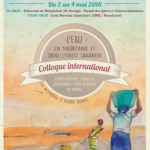International symposium-Tribute to Pierre Bonte: “Water in Mauritania and the West Saharan region : Representations, uses and governance of a shared resource”
Organizing Committee: Ahmed Maouloud Eida El-Hilal (UNA-LERHI), Sebastien Boulay (Paris Descartes-Sorbonne University, CEPED), Mohamed Ould Sheikh Sid Ahmed (Saire gal Faculty of Letters and SH, UNA), Michelle Coste and Danièle Cavanna (CEPED), Rachel Effantin Touyer (Rhizome), Margaux Benchehida (UPDescartes-Sorbonne).
Main academic and scientific partners: Alaasriya University of Nouakchott (UNA), Ecole Normale Supérieure (ENS), University Center for Saharan Studies (CUES), Center for Studies and Research on the Western Sahara (CEROS), Institute of Research for Development (IRD), Jacques Berque Center (Rabat), IMRS, Scientific Council of the Banc d’Arguin National Park (CSBA), Laboratory of Social Anthropology (UMR LAS-College de France), OUISO, NETWORK-P8 (Network of Studies and Exchanges in Social Sciences on Water), UMR CEPED, IRMC
Dates: May 2nd, 3rd and 4th, 2018
Places :
-Mastered at the Faculty of Letters and SHS of the University of Nouakchott
– Afternoon at the Ecole Normale Supérieure of Nouakchott
-Exhibition and conference at the French Institute of Mauritania (IFM)
Scientific Council: Mohamed Salem Ould Merzoug (President of the SC), Anne-Marie Brisebarre (LAS, CNRS), Abdel Wedoud Ould Cheikh (2L2S, University of Lorraine), Abderrahmane Moussaoui (University of Lyon 2), Marie-Christine Cormier-Salem (UMR PALOC, LMI PATEO, IRD), Armelle Choplin (University of Marne-La Vallée), Sheikh Saad Bou Kamara (Dean Fac Lettres and SH, University of Nouakchott), Jean Schmitz (IMAF, IRD), Sylvie Fanchette (CESSMA, IRD), Kane Mamadou Hadya (National Museum), Bakari Mohamed Semega (Faculty of Science, Nouakchott University), Ebnete mint El-Khâles (IMRS), Mohamed Vadel Deida (Director of Higher Education), Béatrice Lecestre-Rollier (CERLIS , Paris Descartes University), Barbara Casciarri (Paris 8 University, P8-NETWORK), Olivier Leservoisier (CEPED, Paris Descartes University).
Summary of the argument:
The Sahara is characterized by its aridity which represents the main constraint to the human settlement and justifies the low densities of population as well as their strong adaptation to the conditions of the environment. This adaptation thus first and foremost meant controlling the water supply for men, their herds and their plantations. Saharan and Sahelian societies have developed knowledge, techniques and organizations focused on this access to water and its distribution. The changes in lifestyle and social organization imply a quantitative and qualitative transformation of this access to water and its distribution in the new rural, urban and industrial environment that is needed in this area. It should be added that this development is in the context of new knowledge revealing unsuspected resources, particularly in fossil water, throughout this space and new techniques for their exploitation.
This symposium aims to question the major past and present issues surrounding this resource and the prospects for innovation that are emerging in Mauritania and throughout the sub-region
